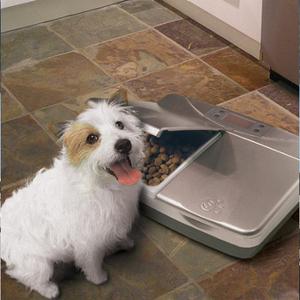 It started with a little scratching now and then. But now, your dog is incredibly itchy. He has been scratching his ears and licking his feet obsessively. Maybe it is his hind end that is making him uncomfortable. You use flea control year round, but you check for fleas anyway and find none. Nothing in his environment has changed. Your other pets are not scratching at all. What could the problem be? Finally, you take him to your veterinarian who suggests that your dog may have a food allergy.
It started with a little scratching now and then. But now, your dog is incredibly itchy. He has been scratching his ears and licking his feet obsessively. Maybe it is his hind end that is making him uncomfortable. You use flea control year round, but you check for fleas anyway and find none. Nothing in his environment has changed. Your other pets are not scratching at all. What could the problem be? Finally, you take him to your veterinarian who suggests that your dog may have a food allergy.
Most Common Allergies
Just like people, pets can sometimes become allergic to the food they eat. Your dog or cat can become allergic to 1 or more ingredients that make up his diet. Usually it is the protein source. The proteins most likely to cause an allergic response in dogs are beef, dairy, lamb, eggs, and chicken. The most common allergens for cats are chicken, dairy, and fish. Pets can also develop an allergy to a carbohydrate source like wheat or soy.
Food allergies (also called dietary hypersensitivities) make up about 10% of all allergy cases presented to veterinary hospitals. The most common causes are flea allergy dermatitis and atopic dermatitis. Flea bite allergies can be severe. The saliva from 1 flea bite can cause your pet to chew and bite himself so much that he develops secondary infections. Atopic dermatitis also causes excessive itching, but it is usually triggered by something in his environment like mold, pollen, or dust mites.
Many people are surprised to learn that the food their pet has been eating for years is the cause of his distress. But that's the way food allergies usually work. You must be exposed to an allergen for a while before your immune system launches an attack against it. Most dogs and cats have been eating the same diet for at least 2 years before they start to develop allergic signs. The most common signs of food allergy are chronic ear inflammation, itchy head and neck, itchy hind end, vomiting, or diarrhea. Food sensitivities may also play a role in some gastrointestinal diseases such as inflammatory bowel disease.
 Dogs and cats develop food allergies because their immune system isn't working properly, not because there is something wrong with the food. Their immune system will react to a particular ingredient in the food as if it were a danger to their body. Food sensitivities can develop in either sex or any breed of dog or cat.
Dogs and cats develop food allergies because their immune system isn't working properly, not because there is something wrong with the food. Their immune system will react to a particular ingredient in the food as if it were a danger to their body. Food sensitivities can develop in either sex or any breed of dog or cat.
If you are concerned that your pet may have a food allergy, the first step is to make an appointment with your veterinarian. Your veterinarian will first want to rule out other possible causes for your pet's discomfort like flea bite allergies or atopic dermatitis.
Diagnosing Food Allergies
If food allergies are suspected, your pet will be started on an elimination food trial. This is the only way to positively diagnose a food allergy. This food trial will last for 12 weeks. Very often, you will start to see an improvement in 6 - 8 weeks.
 Before starting the trial, your veterinarian will ask you to provide a complete diet history for your pet. You will be asked what food he is currently eating and what he has eaten in the past. Remember to include all treats, table food, and flavored medications or vitamins. This is important because the diet selected for the trial should have a protein source that he has not eaten before. This is called a novel protein diet. This new diet will use only 1 protein and 1 carbohydrate. The most common novel proteins are venison, rabbit, dick, kangaroo, and fish.
Before starting the trial, your veterinarian will ask you to provide a complete diet history for your pet. You will be asked what food he is currently eating and what he has eaten in the past. Remember to include all treats, table food, and flavored medications or vitamins. This is important because the diet selected for the trial should have a protein source that he has not eaten before. This is called a novel protein diet. This new diet will use only 1 protein and 1 carbohydrate. The most common novel proteins are venison, rabbit, dick, kangaroo, and fish.
Novel carbohydrates are usually oats, potato, or green pea. There are also hydrolyzed protein diets. These foods contain proteins that have been broken down to such a small size that they do not cause an allergic response. Your veterinarian may choose to start a food trial using any of these diets.
If after the 12 week period your pet is no longer showing signs of food allergy, your veterinarian may want to try his old diet again to see if the signs return. This is the "challenge" part of the elimination food trial. This will tell you if it really was something in the diet that was causing your pet such discomfort. Understandably, some people are just happy that their dog or cat is feeling better. They sometimes do not want to continue with this part of the food trial.
Finally, no diet will work if your pet does not eat it. These diets are usually pretty tasty to dogs and cats. If not, you can always contact a Veterinary Nutritionist to formulate a special home-cooked diet using novel ingredients.




